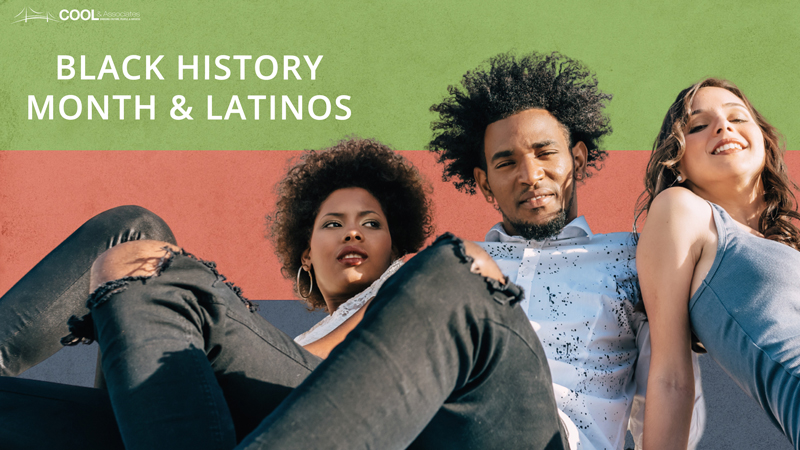February is Black History Month, and Latinos also have reason to celebrate. Findings of the Pew Research Center report that out of 47.9 million people who identified as Black in the U.S., 6% percent were Black Hispanic. This percentage amounts to 2.9 million people spread throughout the country, with the majority residing in the South.
Both Black and Hispanic cultures are rich in history, tradition, and characteristics, so imagine the results of the mixed-race! Accurate information on Afro-Latinos helps us understand the demographic’s extensive impact on society and the benefits of strategic outreach to Latinos, and in particular, Afro-Latinos.
You are Hispanic and…?
Latino identity is the U.S. is not simple nor clear… In forms and surveys such as job applications and the U.S Census, respondents are asked to identify with classifications as Black, White, and Two or More Races, among others. Sometimes one might find a question about ethnicity or additional questions on being Hispanic, Latino, or of Spanish origin.
Since Hispanic heritage is so diverse, Afro-Latinos, a mixed-race within the culture, can be found in countries from Argentina to Venezuela. Although there are many ways to answer the question, a poll by the Pew Research Center showed that Afro-Latinos in the U.S selected to report their race as follows: 39% chose White, 24% Hispanic, 18% Black, 9% Mixed, and 4% Native American.
Black Hispanic Statistics
The Black Hispanic population has grown over 199% since 2000. In 2019, statistics of Black Hispanics demonstrated that 75% of the 2.9 million were comprised of Millennials or Gen Z, driving substantial cultural changes across every spectrum of society, and notably at work and schools.
As of 2022, approximately 26% of Black Hispanics 25 and older hold at least a bachelor’s degree, yet only 18% of the U.S workforce is Latino; furthermore, Latinos only occupy 4% of C-level positions, per a 2021 Axios reports. To bridge this gap, we often recommend that organizations train their HR and hiring staff in basic cultural awareness to ensure hiring practices are inclusive and effective. Additionally, mentoring and talent development within organizations must be adapted to ensure that representation in the upper echelons of leadership becomes a reality. In fact, between 2000 and 2020, there have been only 52 CEOs of Fortune 500 companies who identified as either Black or Hispanic, highlighting a desperate need for culturally appropriate and relevant career pathing and coaching within the talent development process for diverse employees.
Afro-Latinos
Individuals that self-identify as Afro-Latinos have a different perspective of their status in the United States. Many Afro-Latinos are immigrants, often finding themselves outside of any group. Too black to be Latino, too Latino to be Black and sometimes further excluded by other ethnic groups, including other Latinos, yet inordinately proud of their heritage and identity.
Although terms like Spanish, Hispanic, and Latinos seem to encompass one tribe of people, whether indigenous or not, these labels, including the more recent “Latinx,” can be divisive to some fellows of the Black Hispanic group who feel the terms are not sufficiently diverse nor inclusive.
Latinidad, a Spanish term meant to be a phrase that represents all people of Latin descent, which has since become the name of a movement raising awareness of Latin cultural identity, alienates some Afro-Latinos that find that the term does not define their identity well.
Latinos hail from over 20 different countries, and as the term implies, Afro-Latinos have origins in Africa, adding another dimension to their cultural identity when compared to Latin groups with a more substantial European descent. Through cross-cultural communication and interaction, the African influence has intertwined with the European resulting in the rich, yet complex community of Afro-Latinos we see today.
Appropriate communications from informed and experienced partners, vendors and marketing agencies, those that own “storytelling” is one of the main drivers to changing the narrative around inclusion, through accurate and accepted terminology.
Culture
Black History Month celebrates African culture, which includes Afro-Latinos. Forced migration through slavery resulted in many Africans ending up in South America, entering through Brazil. This changing demographic has made it the country with the most significant African population outside of Africa.
Over time, through natural migration, or the continuation of slavery, the culture expanded throughout Central and South America and into the Caribbean. This growth of African descendants resulted in an injection of African culture among parts of these countries. African culture is the foundation for many of the arts in the region. Literature in the area is reminiscent of African lore, dances to African choreography, and music reflects African rhythm. The prominence of these origins is evident in the popular genres of music enjoyed today, such as reggae from Jamaica, Cuban mambo, and Puerto Rican salsa, each inspired by African culture.
Although the first thing that comes to mind when hearing “Black History Month” is perhaps “African-American,” many Hispanic or Latino nationalities can follow the African prefix, meaning Afro-Venezuelan, Afro-Dominican, etc. and should be commemorated during this time of year.
Notable Afro-Latinos
As with every racial group, the Afro-Latino community has contributed significantly to the richness of our country. Prominent Afro-Latinos are found in all industries, although many names are most recognizable in the entertainment industry. Here is a far-from-exhaustive list of Afro-Latinos you may recognize from recent history:
- Elizabeth Acevedo – Poet, Novelist – Dominican
- Carmelo Anthony – NBA player, Puerto Rican
- Cardi B – Rapper, Songwriter, Dominican
- Mariah Carey – Musician, Actor, Afro-Venezuelan
- Jose Celso Barbosa – Physician, Sociologist, Politician, Puerto Rican
- Roberto Clemente – Professional Baseball Player, Puerto Rican
- Jesus Colon – Activist, Puerto Rican
- Dina Eastwood – Reporter, News Anchor, Actress, Spanish, Puerto Rican
- Brian Flores – NFL Head Coach, Honduran
- Bruno Mars – Musician, Puerto Rican-Filipino-Hawaiian
- Soledad O’Brien – Journalist, African, Cuban, Australian and Irish
- Charles Rangel – Politician, Veteran, African American, Puerto Rican
- Arturo Schomburg – Historian, Researcher and founder of Schomburg Center for Research in Black Culture, Puerto Rican
- Juan Williams – Journalist, Political Analyst, Panamanian
- Daddy Yankee – Reggaeton, Afro-Puerto Rican
Although considered a minority in the United States, Afro-Latinos hold a few major titles and contributions as a people.
What’s Next? Afro-Latino Infusion
The Afro-Latino label is complicated yet promising. Afro-Latinos are multidimensional individuals with a rich and complex history, resulting in a wealth of perspective and creativity. Culture is a sensitive subject, and even the best outreach intentions may suffer from unintentional insensitivity. There is much to consider regarding Black Hispanics and the Afro-Latino community, so incorporating appropriate and effective strategic initiatives into current talent management policies and client acquisition campaigns will certainly benefit all organizations aiming to grow sustainably. For example, something as simple as a proper transcreation to ensure your intended message is effectively translated into Spanish to engage Spanish-dominant Afro-Latinos will dramatically increase your engagement, whether directed to students, employees, or voters.
Let Black History Month be a reminder that some Hispanics and Latinos also associate with the African and African American culture and heritage and although this commemorative period is only celebrated in February, remember that they remain African American or Afro-Latino the rest of the year.
To that end, ensure your policies and practices reflect your commitment to equity and inclusion year-round.


